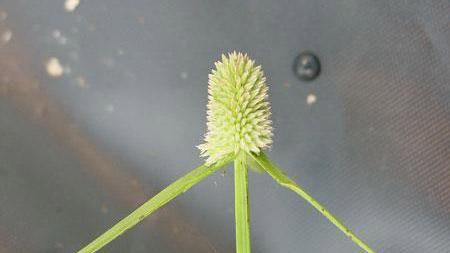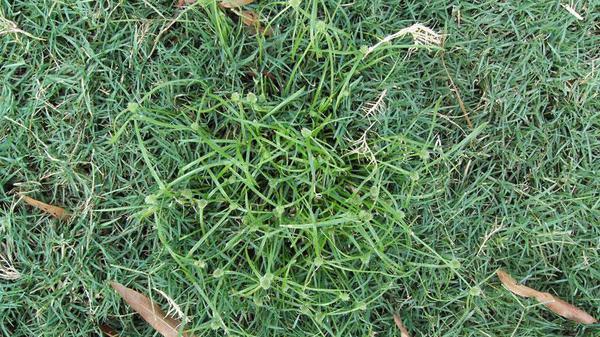Description
Green kyllinga (Kyllinga brevifolia) and false green kyllinga (Kyllinga gracillima) are very similar in appearance, and both are referred to as green kyllinga. Both species are native to Asia and are spreading rapidly in turfgrasses in the southern United States. Both are perennial species with well-developed rhizomes. Kyllingas tend to have a finer leaf texture and are shorter growing than other sedges. They thrive under close mowing situations (inch or less) and are very prolific in areas that are poorly drained or frequently wet. These two species are mat-forming sedges and have been observed to take over turfgrasses in the southeastern United States. Green kyllinga is very difficult to control once the large mats form. The range of these two species is somewhat misleading because they are spreading rapidly. It is believed that spread of these two species may be due to a change in crabgrass control practices in recent years.
Cultural Control
Green kyllinga and false green kyllinga are both perennials that tend to thrive under close mowing (inch or less) and are very prolific in areas that are poorly drained or frequently wet. Green kyllinga is very difficult to control once the large mats tend to form.
Species Data
Publication date: Oct. 27, 2017
Recommendations for the use of agricultural chemicals are included in this publication as a convenience to the reader. The use of brand names and any mention or listing of commercial products or services in this publication does not imply endorsement by NC State University or N.C. A&T State University nor discrimination against similar products or services not mentioned. Individuals who use agricultural chemicals are responsible for ensuring that the intended use complies with current regulations and conforms to the product label. Be sure to obtain current information about usage regulations and examine a current product label before applying any chemical. For assistance, contact your local N.C. Cooperative Extension county center.
N.C. Cooperative Extension prohibits discrimination and harassment regardless of age, color, disability, family and marital status, gender identity, national origin, political beliefs, race, religion, sex (including pregnancy), sexual orientation and veteran status.


